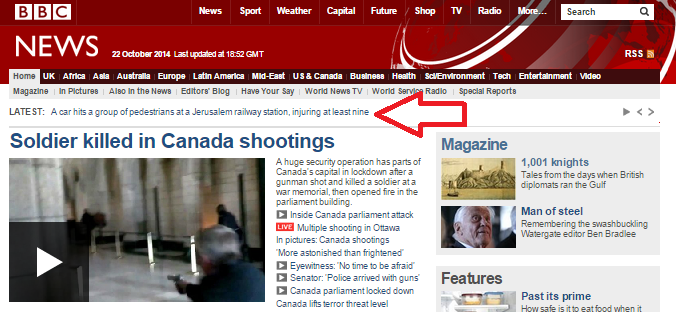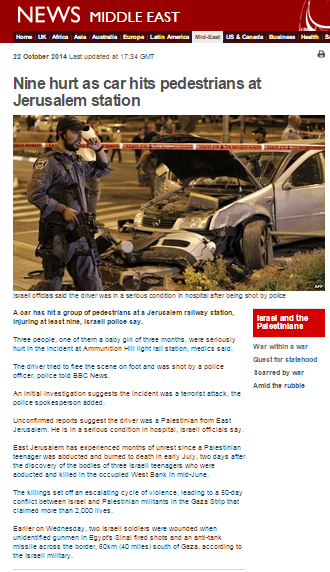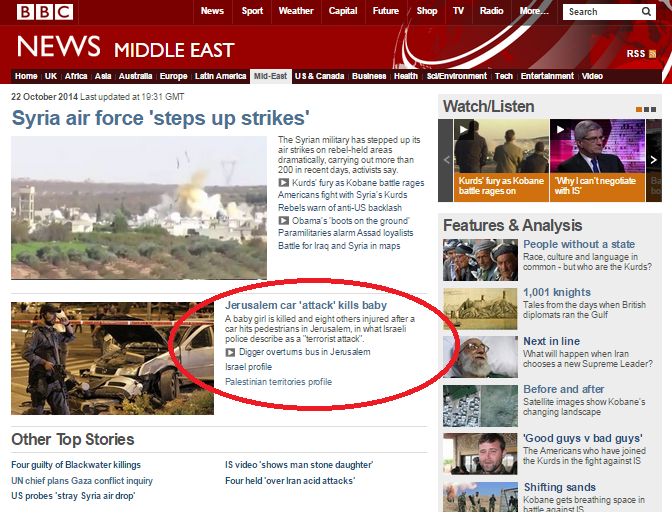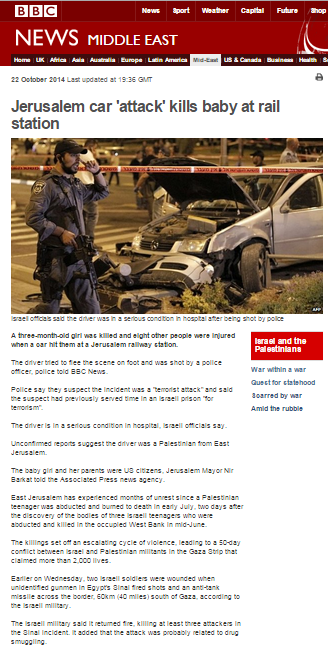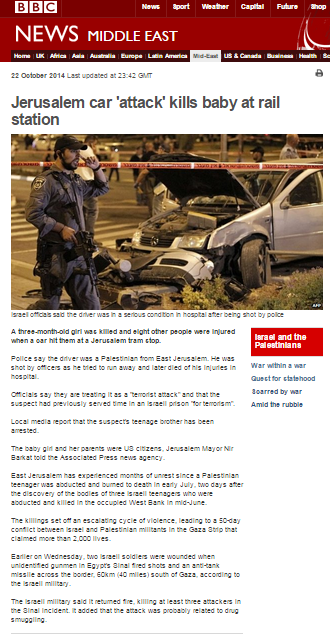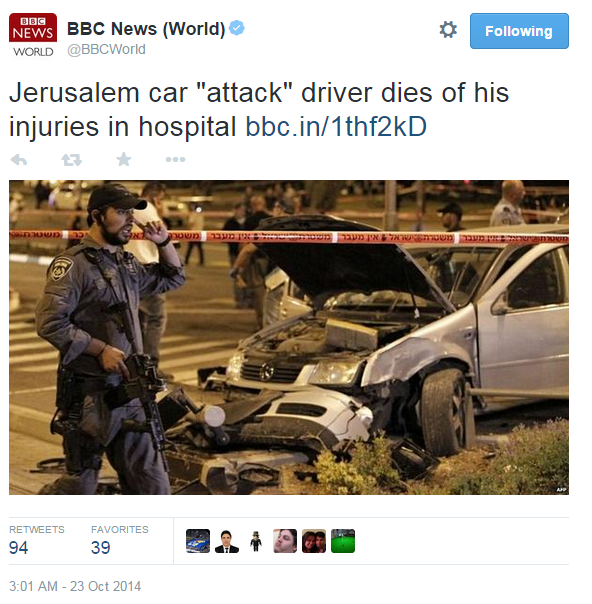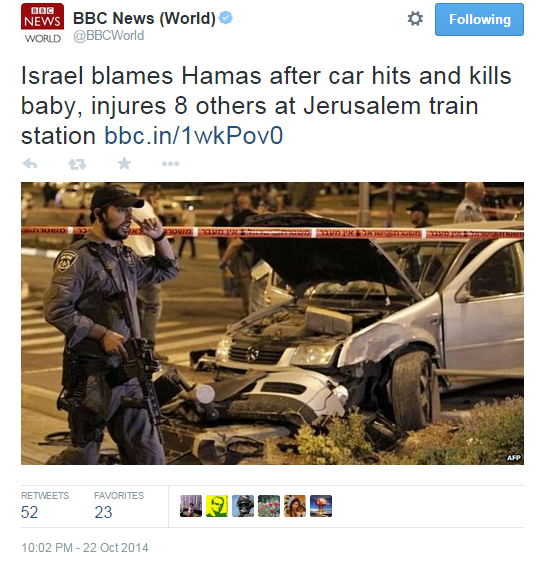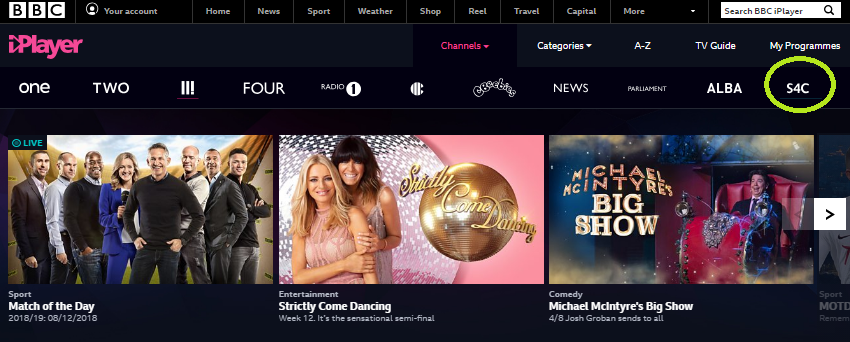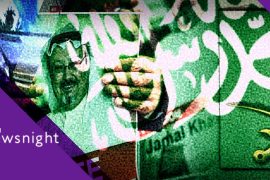On the evening of October 22nd the BBC News website reported on a terror attack which had taken place in Jerusalem a couple of hours previously.
Abd al Rahman Shaloudi from Silwan ploughed the car he was driving into a group of people waiting at the light rail station at Ammunition Hill, injuring nine of them, including three month-old Haya Zissel Braun who later died from the injuries she sustained. Shaloudi – a member of a known Hamas-linked family who had previously been imprisoned for throwing petrol bombs at motorists – tried to escape the scene on foot and was shot by a member of the security forces, later dying of his wounds. Rioting subsequently took place in the neighbourhoods of Silwan and Issawiya, with at least one motorist injured by stone-throwers.
So what were BBC audiences told about the incident? On the BBC News website’s homepage it was initially presented in language suggesting an accident: “A car hits a group of pedestrians at a Jerusalem railway station, injuring at least nine”.
On the website’s Middle East page a similar impression was given.
The initial version of the BBC News website’s report was also headlined in a manner which made the incident look like a road traffic accident: “Nine hurt as car hits pedestrians at Jerusalem station”. That misleading impression continued in the body of the report with readers encountering the word terror only in the fourth paragraph.
The second version of the report (published some two hours later) was presented on the website’s Middle East page under the heading “Jerusalem car ‘attack’ kills baby”.
The link led to the second version of the report – similarly ambiguously titled “Jerusalem car ‘attack’ kills baby at rail station”. Apparently the attack – presented in typical BBC ‘we’re not saying it actually was an attack’ inverted commas – was carried out by a car rather than a person. In the body of that report punctuation was also used to suggest to readers that there is room for doubt as to whether the incident was a terror attack. Three of the victims were described as “American” – the fact that they are also Israeli Jews is not mentioned. The incident was ‘contextualised’ for readers as being part of a “cycle of violence” and inaccurate BBC promotion of the causes of the summer conflict between Israel and Hamas continued with the hundreds of missile attacks on Israeli civilians which preceded the military operation once more erased from audience view.
The report’s third version appeared some six hours after the publication of the initial report. By that time the identity of the victim was known and yet Haya Zissel Braun was not named in the BBC article. At that stage the name, Hamas connections and details of the previous convictions of the perpetrator were also known but the BBC elected to refrain from informing audiences of those details, instead promoting a slightly amended version of the ambiguous and interestingly punctuated statement from the previous version of the report.
“Officials say they are treating it as a “terrorist attack” and that the suspect had previously served time in an Israeli prison “for terrorism”.
On official BBC Twitter accounts similar use of punctuation was apparent.
Shaloudi’s known Hamas connections were presented exclusively in terms of Israeli claims.
Clearly the BBC’s deliberately ambiguous reporting of this incident fails to provide audiences with the full range of information available in relation to the perpetrator, the victims, the circumstances of the incident itself and the subsequent rioting, thus denying them the ability to reach an accurate understanding of this particular “international issue“.

